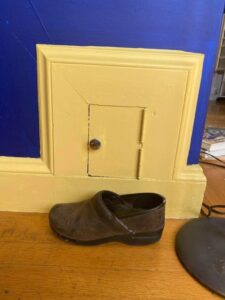The questioner said:
House built in 1916–on the other side of this wall is what used to be a “sewing room”, according to my landlord. the house has about eight bedrooms and was definitely tricked tf out for it’s time period. i can enter the sewing room on the other side, and i’ve looked all around on the floor, where i believe the door would open up to..

but can’t find the backside of the tiny door! it’s painted over, and feels very secure- almost locked. this house has a complex laundry chute system but this seems way too small to be a part of it.
this room clearly was built as a bedroom, as there is a bathroom and a closet, neither of which are near this bizarre little architectural feature.
Some of the answers:
Nestled within the historic Spruce Hill neighborhood of Philadelphia, Pennsylvania, stands a testament to timeless elegance and architectural ingenuity: the Victorian masterpiece crafted by the renowned architect George Hewitt. This majestic residence, steeped in rich history and adorned with intricate details, serves as both a beacon of Victorian charm and a symbol of the neighborhood’s enduring allure.
George Hewitt, a prominent figure in 19th-century American architecture, left an indelible mark on Philadelphia’s landscape with his distinctively designed homes. His keen eye for detail and commitment to craftsmanship are exemplified in this particular gem located in Spruce Hill. Constructed during the height of the Victorian era, this residence stands as a testament to the opulence and sophistication of the time.
From the moment one sets eyes on the exterior façade, it becomes evident that this home is a work of art. Elaborate trimmings, ornate gables, and a meticulously crafted porch invite visitors to step back in time and immerse themselves in the grandeur of the Victorian era. The intricate woodwork, often referred to as “gingerbread,” adorns the exterior, adding a whimsical charm that is quintessentially Victorian.
Upon entering the home, guests are greeted by an interior that seamlessly blends classic elegance with modern comfort. High ceilings, intricate moldings, and stained glass windows evoke a sense of grandeur, while carefully curated furnishings and decor infuse warmth and character into each room. From the ornate parlor to the cozy sitting rooms, every space exudes a unique charm that reflects the owner’s dedication to preserving the home’s historical integrity.
One of the most striking features of this Victorian masterpiece is its attention to detail. From the hand-carved banisters to the intricate tile work, every element has been meticulously crafted to perfection. The spacious rooms are flooded with natural light, creating an inviting atmosphere that is both elegant and welcoming.
Beyond its architectural splendor, this home holds a special place in the heart of the Spruce Hill community. As one of the neighborhood’s most iconic landmarks, it serves as a focal point for residents and visitors alike, inspiring a sense of pride and admiration for the area’s rich heritage.
In addition to its aesthetic appeal, the George Hewitt-designed Victorian in Spruce Hill stands as a testament to the enduring legacy of its creator. George Hewitt’s contributions to Philadelphia’s architectural landscape continue to be celebrated and revered, with many of his designs still standing as cherished landmarks throughout the city.
As the sun sets on another day in Spruce Hill, the glow emanating from this Victorian masterpiece serves as a reminder of a bygone era—one defined by elegance, craftsmanship, and a commitment to beauty that transcends time. In a world where change is constant, this architectural gem stands as a beacon of stability, offering a glimpse into the past while serving as a cornerstone for the future of the neighborhood. George Hewitt’s legacy lives on, embodied in every intricate detail of this timeless treasure.



